The Power of Play in Preschool Education:
Beyond Just Having Fun
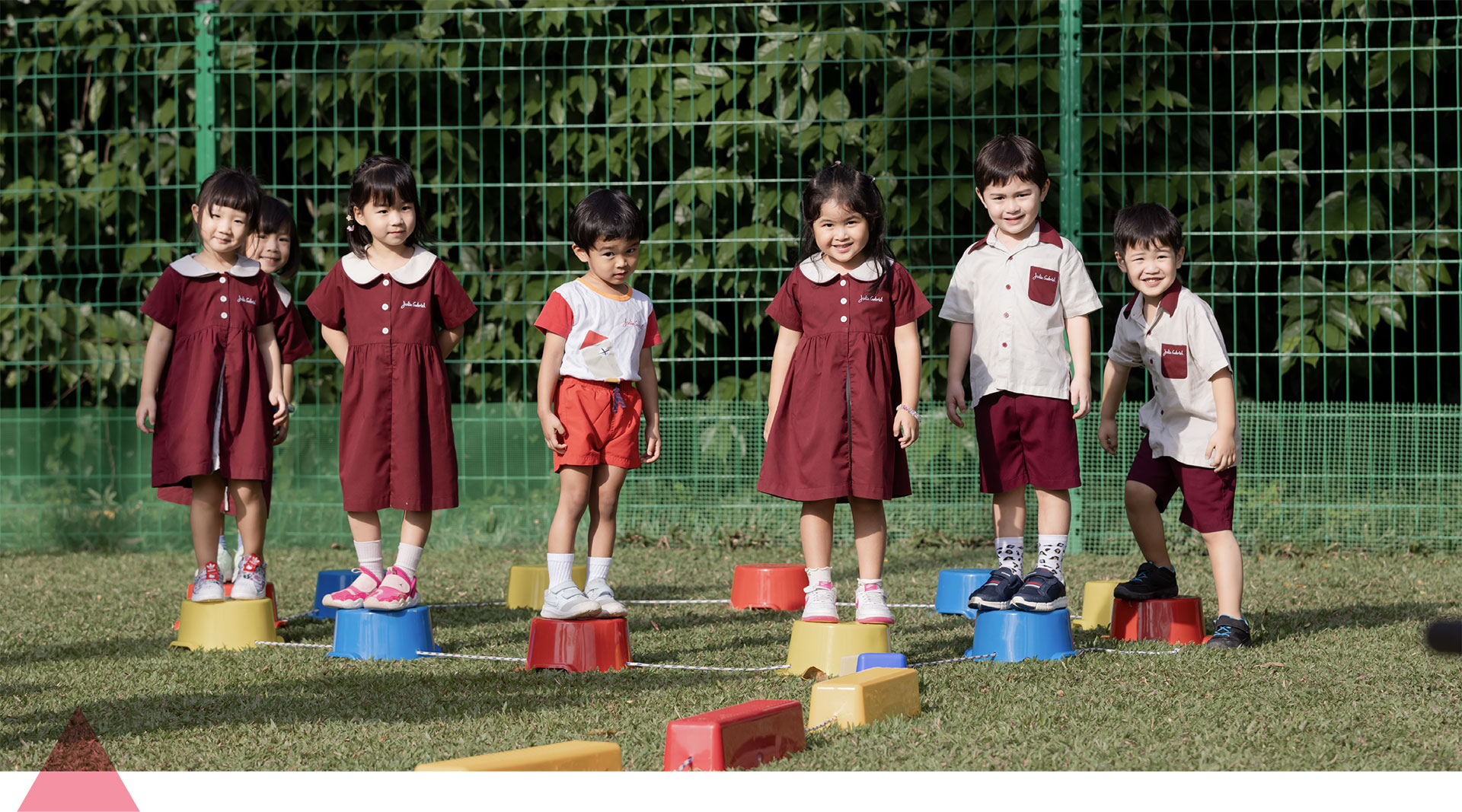
What is Play-Based Learning?
Play-based learning is an approach to early childhood education that uses play as the primary method for children to explore, discover, and make sense of the world around them.
In play-based education, activities are child-led and often open-ended, allowing children to follow their interests, and in so doing solve problems, develop language and social skills, and build cognitive understanding through hands-on experiences. Educators take an active role in observing, guiding, and extending learning during exploration or ‘play’, while maintaining a balance between freedom of choice and more intentional or structured teaching.
The key characteristics of a play-based preschool curriculum typically include:
- Learning through active, meaningful engagement
- Focusing on the process, not just the outcomes
- Emphasis on social, emotional, physical, and cognitive development
- A blend of spontaneous and structured play opportunities
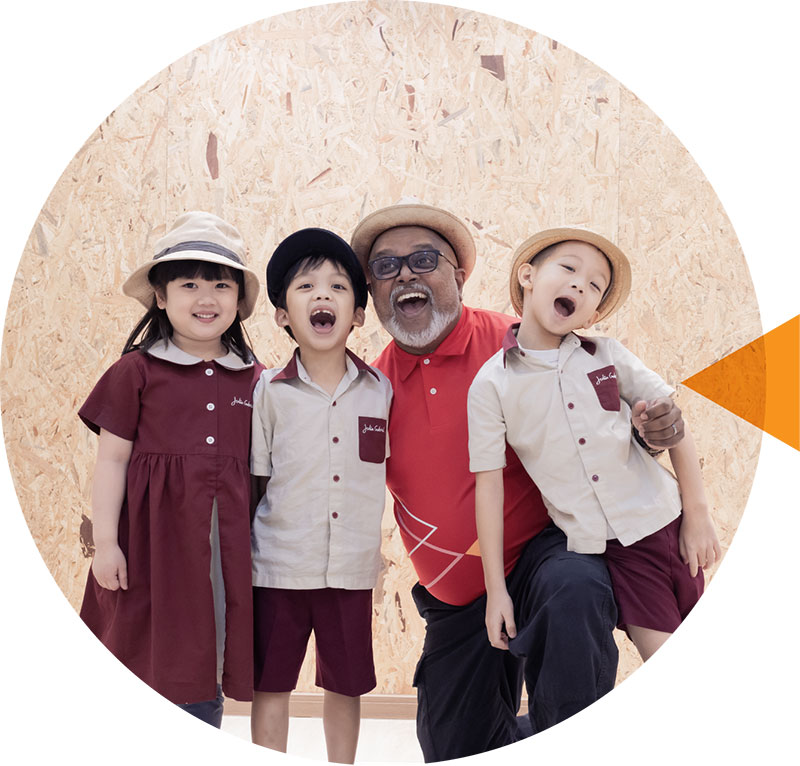
While attendance at a childcare centre or kindergarten prior to Primary 1 is not compulsory in Singapore, the country’s strong commitment to quality preschool programmes—supported by government initiatives to improve accessibility and affordability—is reflected in the high enrolment rates among Singaporean families. According to data released by the Ministry of Social and Family Development (MSF) Family Trends Report 2024:
Children aged 3–4 years: The cohort enrolment rate increased from 75% in 2013 to 90% in 2023.
Children aged 5–6 years: The enrolment rate remained consistently high at 95% in 2023.
This indicates that both parents and government believe that preschool education plays a vital role in the developmental early years of a child’s life, laying the foundation for successful lifelong learning. At Julia Gabriel Preschool, this play-based approach is fundamental to how we nurture young minds, and prepare them for what lies ahead.
The Role of Play in Early Childhood Development

Why Play Matters in Early Learning
Play is far more than simply having fun—it is a vital component of a young child’s development. For many families in Singapore, preschool marks the beginning of a child’s formal learning journey. It is worth remembering that what often appears to be ‘just play’ is, in fact, deep and meaningful learning in action.
At Julia Gabriel Preschool, we view purposeful play as the cornerstone of a strong foundation in early childhood. Through playful exploration, children make sense of the world around them, test ideas, and express their creativity. They solve problems, take risks, and make connections that help shape their understanding.
In these seemingly ordinary moments, children are developing essential cognitive, emotional, and social skills that will support their future learning and life beyond school.
Enhancing Creativity, Curiosity, and Critical Thinking
One of the most powerful benefits of play is its ability to spark creativity and stimulate curiosity. Whether through imagination, role play, construction activities, or storytelling, children are encouraged to explore ideas, ask questions, and think critically. This open-ended engagement fosters a love of discovery and strengthens early reasoning skills.
- Building a tower with blocks becomes an introduction to balance, patience, and problem-solving.
- Acting out a story with puppets offers a chance to explore emotions, sequence events, and practise expressive language.
By supporting child-led inquiry and imaginative exploration, Julia Gabriel Preschool creates a dynamic environment where learning unfolds naturally—with joy, purpose, and depth.
A Singaporean Parent’s Dilemma: Academics or Play?
In Singapore’s academically driven culture, many parents find themselves navigating the tension between ensuring their child is school-ready and allowing space for play – whether guided, free or imaginative. With Primary 1 on the horizon—along with formal reading, writing and arithmetic—it’s easy to feel that play may fall short in preparing children for what’s ahead.
Yet the evidence tells a different story: play and academic learning are not mutually exclusive. In fact, high-quality play lays the groundwork for future academic success.
Research consistently shows that children who engage in rich, purposeful play in their early years tend to perform better in language, literacy, and numeracy later. That’s because play builds the underlying cognitive and emotional skills needed for school readiness—like focus, memory, communication, and self-confidence.

At Julia Gabriel, our preschool programmes blend play with learning through our signature EduDrama® methodology. EduDrama® is a unique methodology that blends a clear learning structure with intentional, purposeful play to create engaging, meaningful experiences for children. Rooted in educational theory and developmental psychology, EduDrama® harnesses the power of dramatic play to support cognitive, linguistic, social and emotional growth. What does this tell us? That play is vital for early brain development.
EduDrama® enables us to effectively balance structured learning outcomes with imaginative exploration. Activities are carefully curated to support the achievement of developmental milestones, ensuring that each child progresses confidently and holistically.
While play is central to the experience, it is never without purpose. The methodology is both rigorous and responsive—underpinned by clear objectives, aligned with educational goals, and delivered through nurturing, child-centred facilitation. With EduDrama®, play becomes a powerful vehicle for learning, encouraging children to express themselves, connect with others and build essential life skills in a joyful, supportive environment. For example:
-
Balancing Structured and Unstructured Play
Both structured and unstructured play are key to early learning. Guided activities teach cooperation and problem-solving, while free play encourages creativity and independence. Our preschool programmes combine both to create a rich, balanced learning environment. -
Play as a Path to Academic Learning
Through playful activities like puppet shows, counting games, and hands-on science exploration, children naturally build literacy, maths, and scientific thinking—while having fun and staying curious.
What Makes a Quality Play-Based Preschool Curriculum?
A Look Inside Julia Gabriel Preschool Programmes
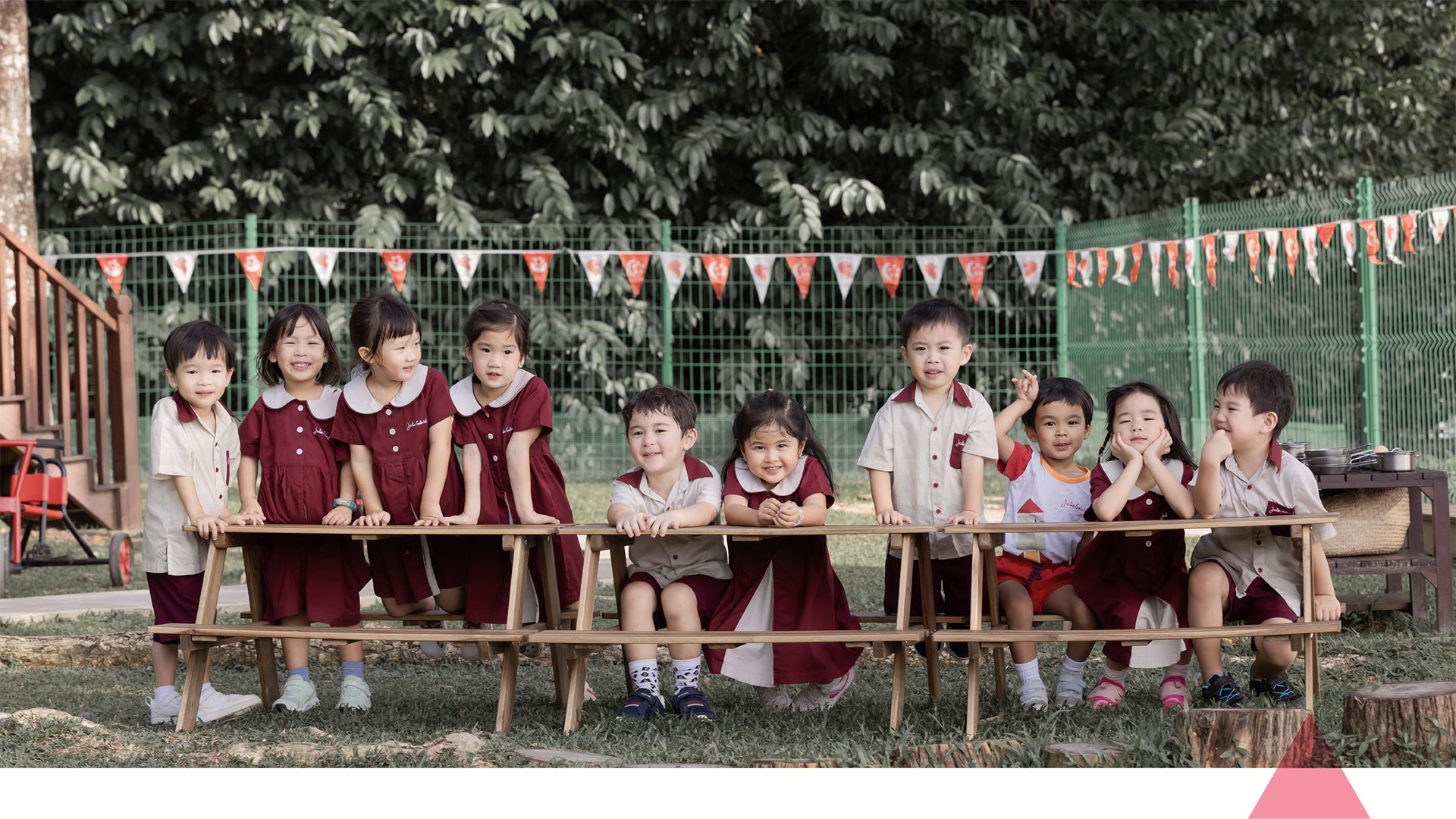
An Overview of Our Levels: From Pre-Nursery to Kindergarten 2
Our preschool programmes are carefully tailored to each age group. Development at each level builds on the one before, ensuring children progress with confidence and joy.
-
Pre-Nursery (18 months – 2 years):
A gentle, play-rich introduction to learning that fosters emotional security, motor skills, and sensory discovery. -
Nursery 1 & 2 (3–4 years):
Engaging activities that nurture communication, confidence, social skills, and early literacy and numeracy through purposeful play. -
Kindergarten 1 & 2 (5–6 years):
An integrated curriculum that blends thematic projects and academic preparation with creativity, collaboration, and self-leadership.
Core Learning Elements in Preschool Curricula in Singapore
The preschool curriculum in Singapore is designed to offer a well-rounded foundation for young learners. At Julia Gabriel Preschool, our EduDrama® methodology underpins the way all subjects are taught, shaping the environment and interactions to make learning purposeful, meaningful, and joyful. Experiential, child-centred learning combined with language-rich experiences build confidence, creativity, and communication from the earliest years.
- Language and Literacy: Developing communication skills through reading, storytelling, and dramatic play. Includes a robust Mandarin bilingual curriculum.
- Numeracy and Maths: Introducing foundational mathematical concepts through hands-on, interactive experiences.
- Aesthetics and Creative Expression: Encouraging creativity through art, music, movement, and role play.
- Physical and Motor Skills Development: Building coordination, balance, and spatial awareness through active play and guided physical activities.
- Additional Programmes to Encourage Enhanced Learning: Young Entrepreneurs (I Can!), Give & Grow (Sustainability & Gardening), Harmony Heroes (Caring for the Community), Coding, Content Creation, Science and Technology, Exploration and Discovery, and more.
- Mindfulness: Mindfulness is integrated into daily routines at Julia Gabriel Preschool through Mindful Moments, a dedicated programme where children engage in simple, age-appropriate practices like breathing exercises, sensory awareness, and quiet reflection. These activities help develop self-awareness, emotional regulation, focus, empathy, gratitude, and resilience—building a strong foundation for lifelong well-being.
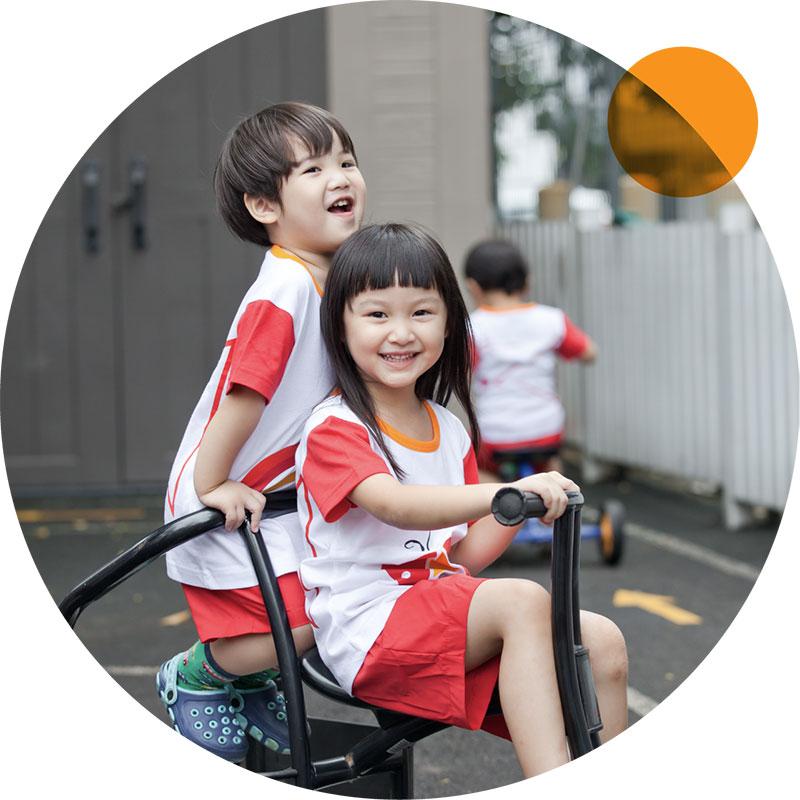
Examples of Play-Based Learning at Julia Gabriel Preschool
At Julia Gabriel Preschool, play is woven into every facet of the curriculum, ensuring that learning is both meaningful and enjoyable. Our carefully planned play-based activities engage children’s natural curiosity while supporting their holistic development. Here are some examples:
- Outdoor Games: Activities such as obstacle courses and nature walks not only enhance physical coordination and strength but also nurture an appreciation for the natural world and promote observational skills.
- Sensory Play: Interacting with materials like sand, water, and clay stimulates cognitive development and fine motor skills, while helping children explore different textures, temperatures, and properties in a hands-on way.
- Group Projects: Collaborative tasks such as model building and collective art creations develop essential social skills, including communication, cooperation, and creative problem-solving, through shared effort and teamwork.
What Are the Long-Term Benefits of a Play-Based Preschool Education?
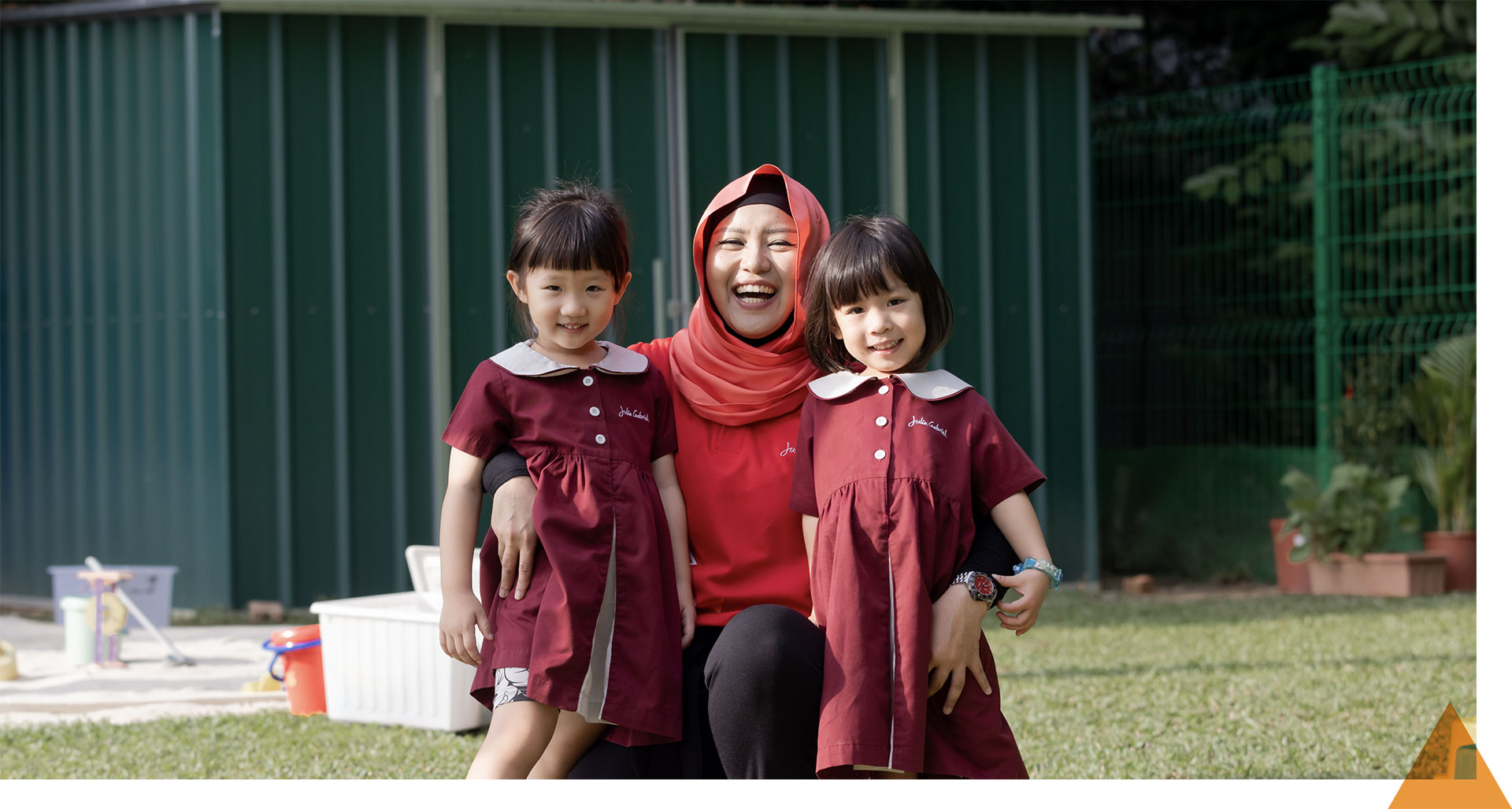
Confidence, Independence, and Curiosity
Children who engage in play-based learning often develop greater confidence and independence. They are encouraged to explore, make decisions, and take ownership of their learning. This nurtures a strong sense of self, resilience, and a curious mindset that continues to grow with them.
Academic Readiness Without Burnout
Our preschool curriculum prepares children for primary school without the pressure of rote memorisation or rigid instruction. Through age-appropriate, play-based experiences, they develop the essential skills needed to thrive in a more formal academic setting—while maintaining their natural enthusiasm and love of learning.
Life Skills that Go Beyond Primary School
Play supports more than academic development. It fosters communication, problem-solving, empathy, and teamwork. These essential life skills—developed organically through playful interaction—lay the groundwork for emotional intelligence, positive relationships, and future leadership.
How We Foster Emotional Growth in Our Preschoolers:
Building Emotional and Social Skills Through Play
Social-emotional learning (SEL) is a cornerstone of our preschool curriculum. Through SEL, children learn to understand and manage their emotions, cultivate positive relationships, and make responsible decisions. Activities such as group discussions, cooperative games, and empathy exercises help them develop self-awareness and essential social skills.
Examples of Socio-Emotional Learning at Julia Gabriel Preschool
Emotional growth is nurtured through both guided and spontaneous interactions:
- Circle Time: We establish a daily routine in a safe, inclusive setting, where children share experiences, talk about their feelings, and strengthen their sense of belonging.
- Peer Interaction: Children are given opportunities to play and collaborate, navigate disagreements constructively, and build friendships—fostering respect and social understanding.
- Teacher Guidance: Educators serve as role models and emotional coaches, offering support as children navigate emotional challenges and celebrate successes.
These practices create a supportive environment where children feel valued and understood, promoting emotional well-being.
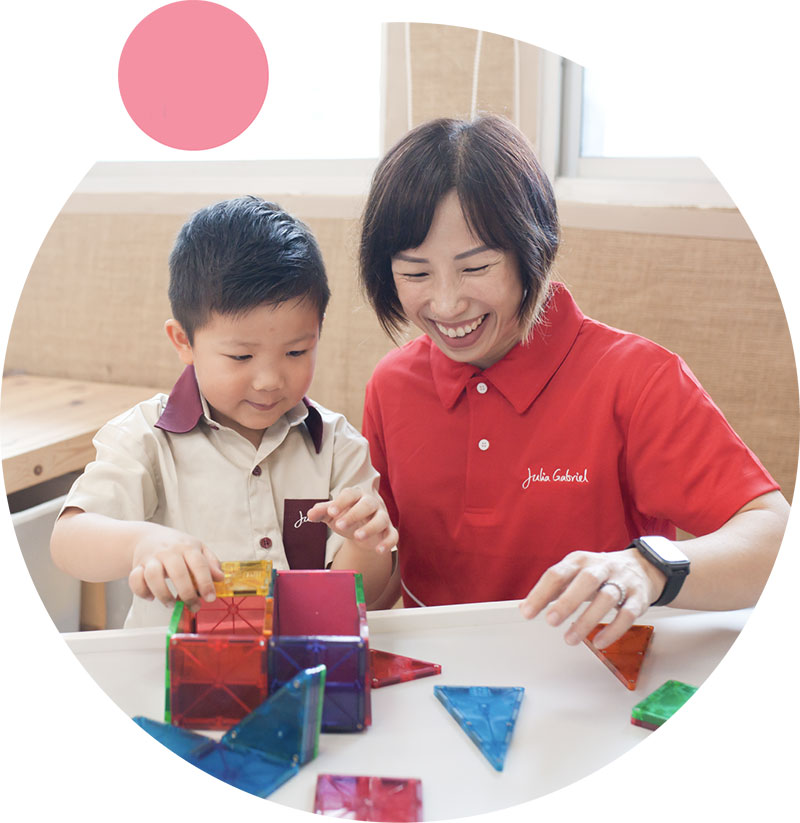
Children Learn Key Socio-Emotional Skills Like Empathy, Patience, and Cooperation
In our classrooms, children are encouraged to:
- Practise Empathy: By listening to stories and engaging in role play, they learn to recognise and share others’ feelings.
- Develop Patience: They learn to wait their turn during games and activities, fostering self-control and consideration.
- Cooperate with Peers: Through collaborative projects and conflict resolution, they build teamwork and negotiation skills.
- Learn Mindfulness Strategies: Activities such as simple breathing exercises and brief guided reflections support emotional literacy, resilience, and a positive self-image—helping them pause, focus, and respond calmly to their emotions.
These socio-emotional skills are fundamental for personal growth and lay the groundwork for healthy, future relationships.
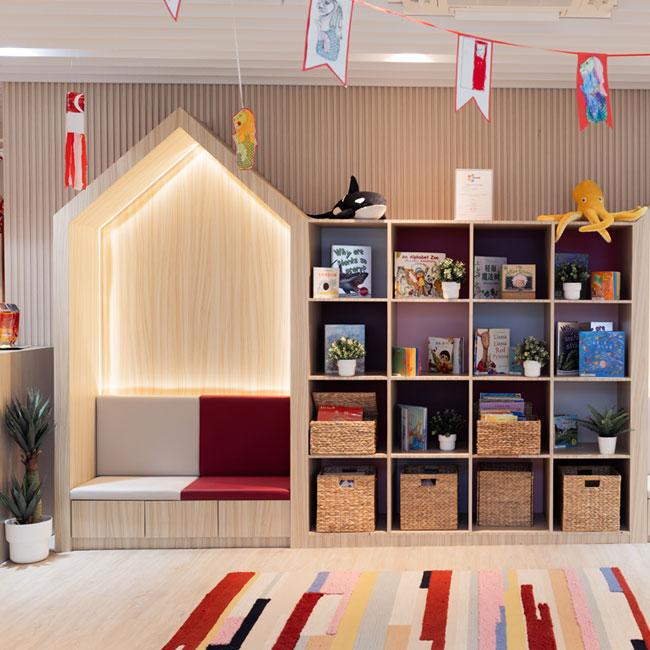
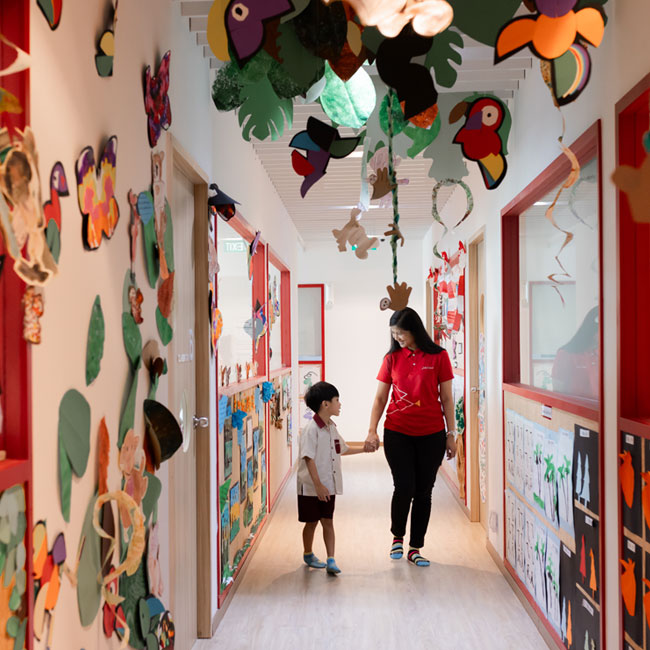
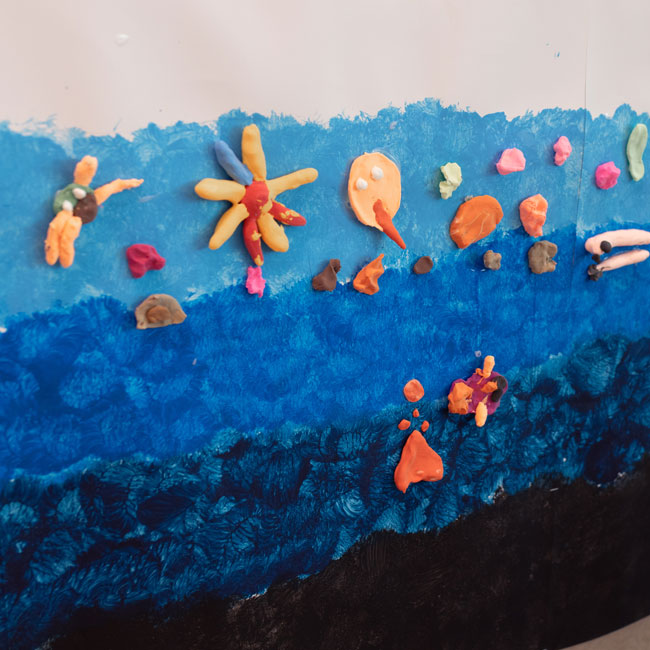
Our Facilities: How Julia Gabriel Preschools are Built for Learning Through Play
Abundance of Sensory Corners, Reading Nooks, and Outdoor Classrooms
Our centres are designed to spark wonder and exploration. Sensory corners invite hands-on learning, reading nooks encourage quiet moments with books, and outdoor classrooms support movement, discovery, and gross motor development. Every space is created with your child’s growth and joy in mind.
Health and Safety in Our Learning Environment
We uphold the highest standards of safety and hygiene. All toys and materials are regularly cleaned and rotated to ensure freshness and safety. Facilities are cleaned daily and thorough sanitisation takes place before and after mealtimes.
Our classrooms are airy, bright, and child-friendly, giving your child the confidence to explore and thrive in a secure and healthy environment.
Experience it for Yourself: Book a Personalised School Tour
We invite parents to visit and experience the Julia Gabriel difference. Book a personalised tour to explore our unique environments, meet our passionate teachers, and see firsthand how our children learn through play. Enquire here to visit your preferred Julia Gabriel Preschool location.
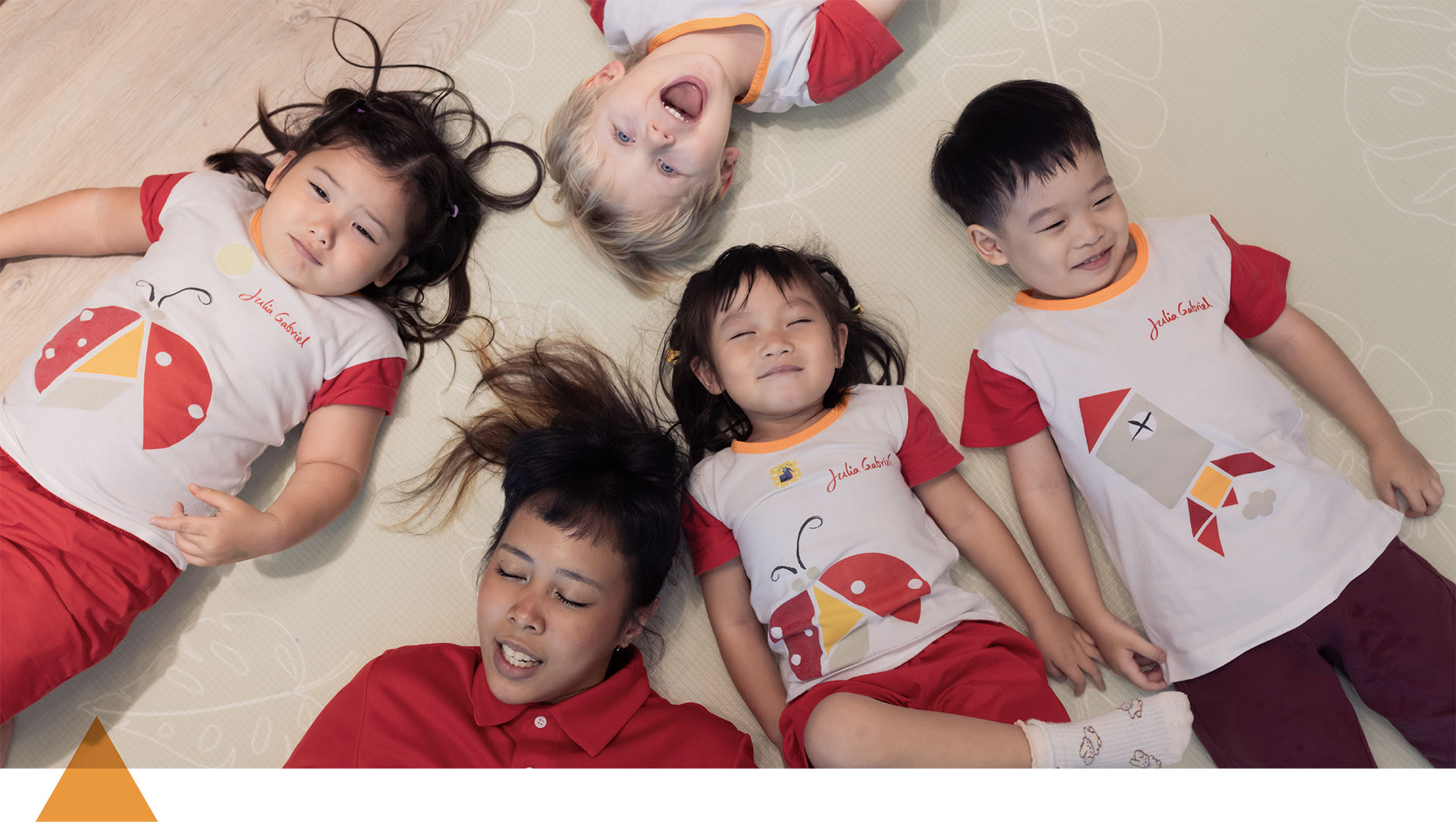
Partnering with Parents: Supporting Play at Home
At Julia Gabriel Preschool, we see parents as key partners in a child’s growth. We encourage play-based learning to continue at home to reinforce what’s learned in school.
Just 15 minutes of creative, hands-on play each day—like storytelling, building, or pretend play—can strengthen skills and deepen the parent-child bond.
Creating Consistency: Encouraging Meaningful Play After School
When values like curiosity and creativity are reflected both at home and school, children thrive.
We support families with regular updates, activity ideas, and tips to align learning across environments—so your child feels confident, inspired, and supported wherever they are.
Simple Home Activities that Build Learning
You don’t need expensive toys or elaborate setups to support your child’s development through play. Here are a few easy, screen-free activities you can do at home that align beautifully with the preschool curriculum in Singapore:
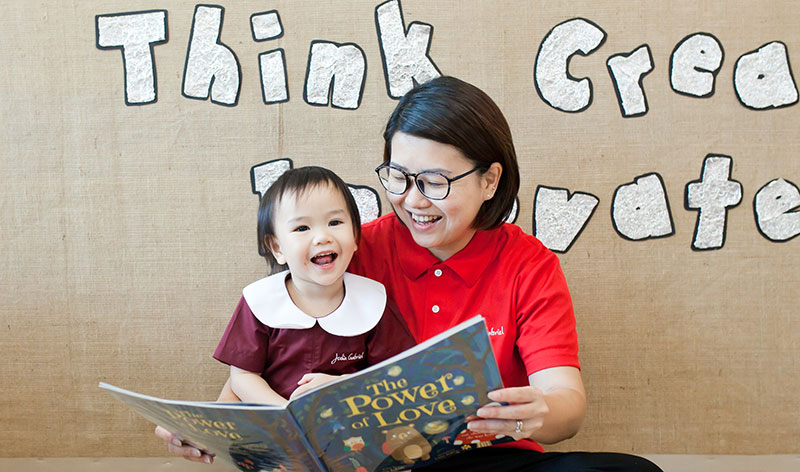
Home Activity
Story Time with Expression
Example: Read We’re Going on a Bear Hunt together, using different voices for each character and pausing to ask how the child thinks the bear feels when “it’s cold” or “it’s dark”.
Skills Developed
Speaking, listening, empathy
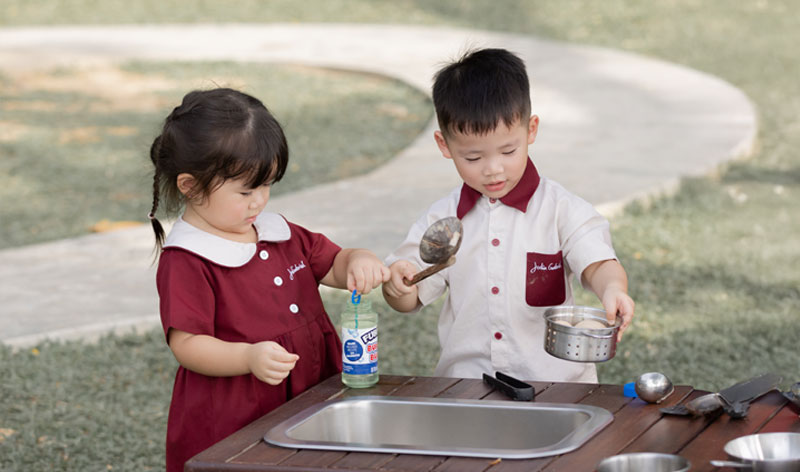
Home Activity
Kitchen Helpers
Example: Bake simple sugar cookies—let your child measure the flour, crack the egg, and stir the ingredients, encouraging them to count each spoonful and follow each step in the recipe.
Skills Developed
Numeracy, fine motor skills, following instructions
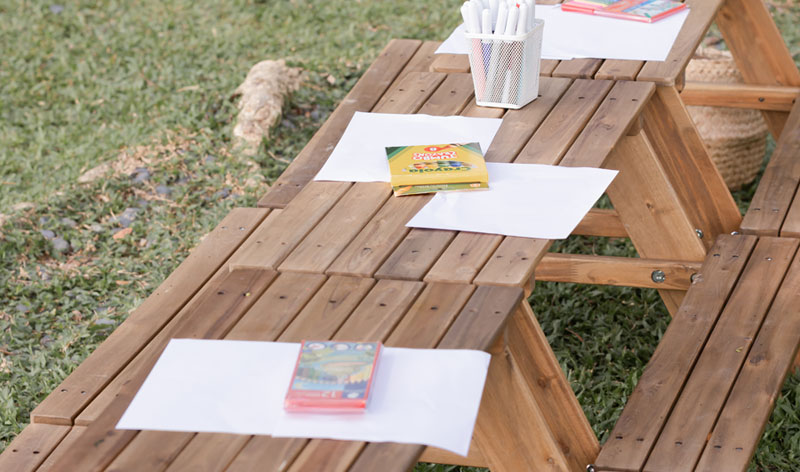
Home Activity
DIY Art Corner
Example: Provide paper plates, paint, coloured paper, and glue; challenge your child to design and decorate their own animal mask (e.g. a lion or rabbit), cutting out eye holes and adding details with paint or collage.
Skills Developed
Creativity, focus, hand-eye coordination
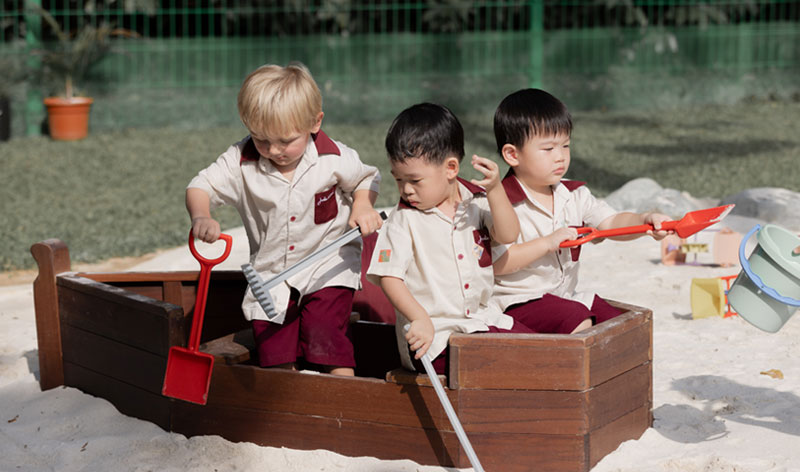
Home Activity
Treasure Hunts at Home
Example: Hide five coloured paper shapes (circle, square, triangle, star, heart) around a room. Give your child simple clues (“It’s under something soft,” “Look near the window”) and a checklist to tick off each shape as they find it.
Skills Developed
Problem-solving, observation, spatial awareness
These moments of shared play at home with your child offer more than just fun—they become powerful learning experiences that help prepare your child for both school and life. They’re also a valuable opportunity to deepen your connection, strengthen your relationship, and gain a better understanding of how your child thinks, feels, and learns.
My son attended K1 and K2 at Julia Gabriel Preschool (formerly known as Chiltern House) and the progress he's made academically and personally has been remarkable. He has grown more independent and enthusiastic about learning, a significant shift from his experience in N1 and N2 preschool.
The teachers and head of the centre deserve immense credit for creating a nurturing environment that combines structure with enjoyment. Their efforts have not only fostered my son's academic growth but also supported his social development. Witnessing his thriving interactions with classmates has been truly rewarding.
Overall, our experience with Julia Gabriel Preschool has been overwhelmingly positive, and we're grateful for the pivotal role they've played in our son's education.


With a small class size, the teachers engage each kids meaningfully. My son is always excited to go to school every day and comes back home happy. Also, I would like to give a shout out to the school management for being open-minded and receptive to parents’ suggestions to improve the school environment.
Appreciate it!

I am very satisfied that Julia Gabriel Preschool provides my 2-year-old with a variety of activities and topics, reading, English and Chinese, and most importantly, an enjoyable school life.


FAQs
about Julia Gabriel Preschool Curriculum and Play-Based Learning
How does play-based learning benefit my child?
Play-based learning enhances creativity, problem-solving skills, and social interaction, making education enjoyable and effective.
What is EduDrama®?
EduDrama® is a unique approach to learning that combines a clear structure with purposeful, imaginative play—helping children develop effective communication skills, problem-solving skills, and creativity, as well as confidence, empathy, and collaboration. The method is both nurturing and rigorous. It’s about more than just having fun—it’s about building strong foundations for lifelong learning, encouraging children to take risks and giving them a distinct advantage throughout their educational journey.
What age group does Julia Gabriel Preschool cater to?
We offer programmes for children aged 18 months to 6 years in Pre-Nursery, Nursery 1 & 2, Kindergarten 1 & 2 levels. Our curriculum and programmes are tailored to each developmental stage.
How does Julia Gabriel Preschool balance structured learning with play?
At Julia Gabriel Preschool, structured learning and purposeful play are not separate concepts—they are thoughtfully integrated through our EduDrama® methodology. This unique approach combines a clear educational structure with imaginative, child-led exploration, ensuring that every playful moment has intent and impact. Our educators design activities that are both meaningful and developmentally appropriate, guiding children toward specific learning outcomes while allowing the freedom to discover and express themselves. The rigour of EduDrama® lies in its careful balance: play is always purposeful, supporting cognitive, language, social, and emotional milestones. In this way, we offer a learning experience that is both joyful and academically robust—where structured goals are achieved through meaningful, engaging play.
How do teachers at Julia Gabriel Preschool guide children during play?
At Julia Gabriel Preschool, our mindful educators are trained in early childhood development and the principles of EduDrama®, enabling them to be present, purposeful, and attuned to each child’s needs. Rather than directing each experience, they observe closely, offering gentle guidance and asking open-ended questions that spark curiosity, encourage expressive language, and deepen thinking. This mindful facilitation ensures that play remains child-led yet rich with learning potential—supporting both self-discovery and meaningful developmental progress.
Will a play-based curriculum prepare my child for Primary 1?
Yes. Our play-based curriculum in Singapore is intentionally designed to build strong foundations in literacy, numeracy, self-regulation, and confidence—key skills for a successful transition to Primary 1.
Children who have the opportunity to engage in meaningful dramatic play tend to adapt better to formal schooling because they’ve built a strong foundation in communication, emotional resilience, and problem-solving. Learn more about the Julia Gabriel Programmes here.
How can I support my child’s development at home using Julia Gabriel’s approach?
You can continue supporting your child through storytelling, open-ended play, creative activities, and rich conversations. Our teachers regularly share home-based learning ideas and progress updates to keep parents aligned with what’s happening in the classroom.
What makes Julia Gabriel Preschool’s curriculum unique in Singapore?
Our curriculum is driven by EduDrama®—Julia Gabriel Education’s unique approach to learning that blends drama with educational outcomes to nurture confident, expressive, and empathetic individuals. We combine a clear learning structure with purposeful, meaningful play to support both academic success and developmental milestones. Through language-rich environments and strong teacher-child relationships, children grow holistically—gaining the confidence, creativity, and collaboration skills that give them an advantage in school and life.
Is Julia Gabriel Preschool suitable for shy or quiet children?
Absolutely, our nurturing, inclusive environment is ideal for children of all personalities. Through guided play, role play, and small group interactions, even the most reserved children gradually gain confidence and learn to express themselves freely.
Your Child’s Future Begins with Play
Building Brighter Beginnings Through Julia Gabriel Preschool and EduDrama®
At Julia Gabriel Preschool, we understand that the early years shape a child’s future in profound ways. Choosing the right preschool is not only about preparing for Primary 1—it’s about nurturing confidence, independence, emotional resilience, and a love of learning that lasts a lifetime.
Through our signature EduDrama® methodology and thoughtfully designed preschool programmes, children learn with joy and purpose. They develop core academic and life skills in a supportive environment where curiosity is encouraged, creativity is celebrated, and social-emotional growth is central to every day.
From sensory corners to outdoor classrooms, from puppet shows to collaborative projects, every element of our preschool experience is designed to empower your child. Because when children learn through play, they thrive—in school and in life.
Let’s begin this meaningful journey together. Let your child discover the power of play at Julia Gabriel Preschool.

